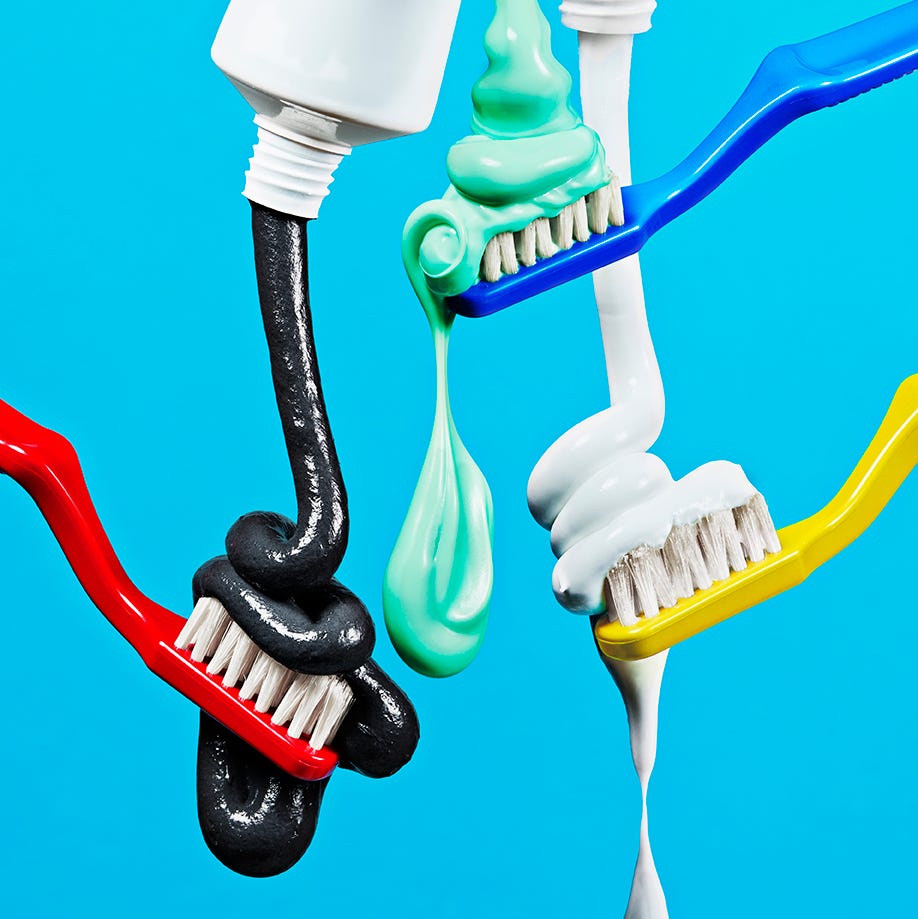Everyone’s Talking About Fluoride—Is It Safe? We Brushed Up on the Research
Who hasn’t dashed into the drugstore and been stymied by the overwhelming number of toothpaste options: mint, fruity, gel, whitening, sensitive—and, increasingly, fluoride-free? Even major companies like Colgate have followed the trend, joining no-fluoride mainstays like Dr. Bronner’s and Tom’s of Maine. No wonder global sales of toothpaste sans fluoride—a mineral—are over $6 billion and projected to soar above $10 billion within a decade. But is fluoride bad for you?
Meet the experts: Mark Wolff, D.D.S., Ph.D., dean of the School of Dental Medicine at the University of Pennsylvania; Dominik Nischwitz, D.D.S., a biological dentist and the author of It’s All in Your Mouth; Howard Pollick, B.D.S., M.P.H., a spokesperson on fluoridation for the American Dental Association (ADA)
There’s a reason it’s in so many products, after all. Prevention bit into years of research to find out.
What is fluoride?
It’s a mineral that appears naturally in rocks, soil, and water. Fluoride was added to toothpaste, as well as many community water systems, in the 1950s after scientists realized that people whose drinking water was naturally higher in fluoride had much less tooth decay. But lately there has been growing criticism of fluoride, with some communities passing or debating legislation to remove the mineral from their water. And now the debate has reached the toothpaste aisle.
Fluoride benefits
To some extent, say many dentists, fluoride is a victim of its own success—it’s a key reason so many of us sport healthy smiles. We’re so unused to major tooth decay that we’ve forgotten how we got here.
As Americans decades ago were all too aware, cavities are destructive holes in teeth that form when the bacteria that consume sugars in our mouths (from sweets and other carbs) produce acids. These acids can dissolve the protective enamel on a tooth’s surface, forming a cavity. Fluoride strengthens resistance to acid and can replenish some of the enamel the bacteria destroy, says Mark Wolff, D.D.S., Ph.D., dean of the School of Dental Medicine at the University of Pennsylvania. In children, fluoridated water strengthens permanent teeth as they start to come in. “We take for granted that we don’t have as much tooth decay,” says Wolff, who has consulted for toothpaste brands, but “it will return if we stop using fluoride.” Even just 50 years ago, he says, “the number of people with decay was massive.”
Nearly 100 toothpaste studies back up the claim that children, teens, and adults who regularly brush with fluoridated toothpaste have much less decay, researchers with the highly regarded Cochrane Library have determined. Another sign of fluoride’s potency: When parts of Canada stopped putting the mineral in their water, more kids in these zones needed dental work, with children 5 and under most at risk, researchers reported earlier this year. “The fluoride research is very clear: Fluoride helps remineralize early and even later-stage cavities,” stopping them from forming or getting worse, says Gretchen Gibson, D.D.S., M.P.H., an associate professor at Kansas City University’s College of Dental Medicine.
Even if your local water system adds fluoride (as is currently true in some 73% of the country), having fluoride in toothpaste is important because its protection is applied directly to teeth. “Not having fluoride in toothpaste increases the risk that more of your teeth will decay and need treatment,” says Howard Pollick, B.D.S., M.P.H., a spokes person on fluoridation for the American Dental Association (ADA).
For people at high risk for cavities, including those with a history of decay and kids who don’t always brush well, a dentist can also apply fluoride directly to teeth. A different Cochrane Library review found fewer cavities in kids who used fluoride toothpaste and whose dentists applied a fluoride gel, varnish, or mouth rinse during cleaning appointments.
Fluoride downsides
The research seems pretty reassuring, right? Well, that’s where things get a bit tricky. Despite fluoride’s well-researched benefits, there is controversy over whether it is in fact safe to consume. Over the years, water fluoridation has been called everything from government mind control to a Communist plot by people on the extreme end of the debate. That said, research does show that extremely high levels of fluoride can be dangerous.
Most of the proven problems are from overconsumption, with very high doses being shown to cause mottled teeth, bone damage, and joint problems, among other issues. This research has involved areas around the world with naturally extreme levels of fluoride in their groundwater, not communities where small, controlled amounts of fluoride are added. Still, the findings have caused some to sour on fluoride.
One concern researchers are still working through has to do with the idea that fluoride could be dangerous to the brain and nervous system, especially in young children, perhaps by causing inflammation and changes to brain cells. This potentially very scary issue, known as neurotoxicity, got a lot of attention when Canadian researchers found an association with slightly lower IQ levels in the preschool sons (but, oddly, not daughters) of women who’d had higher fluoride exposure while pregnant. Other researchers linked lower IQ in children in India with naturally high fluoride in their water.
But there are limits to this research: Both of these studies were what is known as observational, meaning they didn’t prove that one factor caused the other. Another issue was that this research involved fluoride in drinking water, not in toothpaste, which people are not meant to swallow. Even if someone did eat a little, as children commonly do, the amount ingested would be minuscule in comparison to the levels people in these studies took in.
Some anti-fluoride folks, especially those known as biological dentists who also advocate the removal of heavy metals from prior mercury fillings, say they’ll never support fluoride in toothpaste. “Even if the results are not 100% clear, I would always go the safer route and avoid fluoride,” says Dominik Nischwitz, D.D.S., a biological dentist and the author of It’s All in Your Mouth.
A comprehensive assessment from the U.S. Department of Health and Human Services, performed by the National Toxicology Program (NTP), hopes to alleviate concerns about neurotoxicity, but the NTP, which first came together to study the subject in 2015, has yet to release its final report. An incomplete draft that was made public revived the controversy, with an association of biological dentists claiming that the report raised concerns “about the long-term negative health effects of fluoride exposure.” The interim draft was subsequently reviewed by a specially convened working group that made a lot of changes, citing insufficient information and lack of precision in the text. A new draft is in the works and should be published soon.
The bottom line
Until that report comes out, people who wonder if they should be buying fluoride-free toothpastes (or the best natural toothpastes) may be reassured by the ADA’s assessment that fluoride remains safe for children and adults. A review from German researchers also concluded that evidence “does not support” calling fluoride a neurotoxin.
“In the amount people are consuming through toothpaste after spitting, I do not worry about it creating problems,” says Wolff. In fact, fluoride amounts are regulated by the U.S. Food and Drug Administration; companies can’t simply load up their pastes with astronomical levels of it. If people take proper care of their teeth, many can remain cavity-free, he adds, and fluoride toothpaste is the way to do it. “This is true for children, adults, and seniors alike,” Pollick says.
Fluoride alternatives
If you go fluoride-free, you’ll need to severely limit sugary snacks and beverages to keep bacteria and their acids away from your teeth, Pollick says.
If you’re unsure, you could use a paste with the fluoride alternative hydroxyapatite, such as Davids; small studies have shown that this ingredient also prevents cavities, but there’s less research proving its safety than there is for fluoride.



